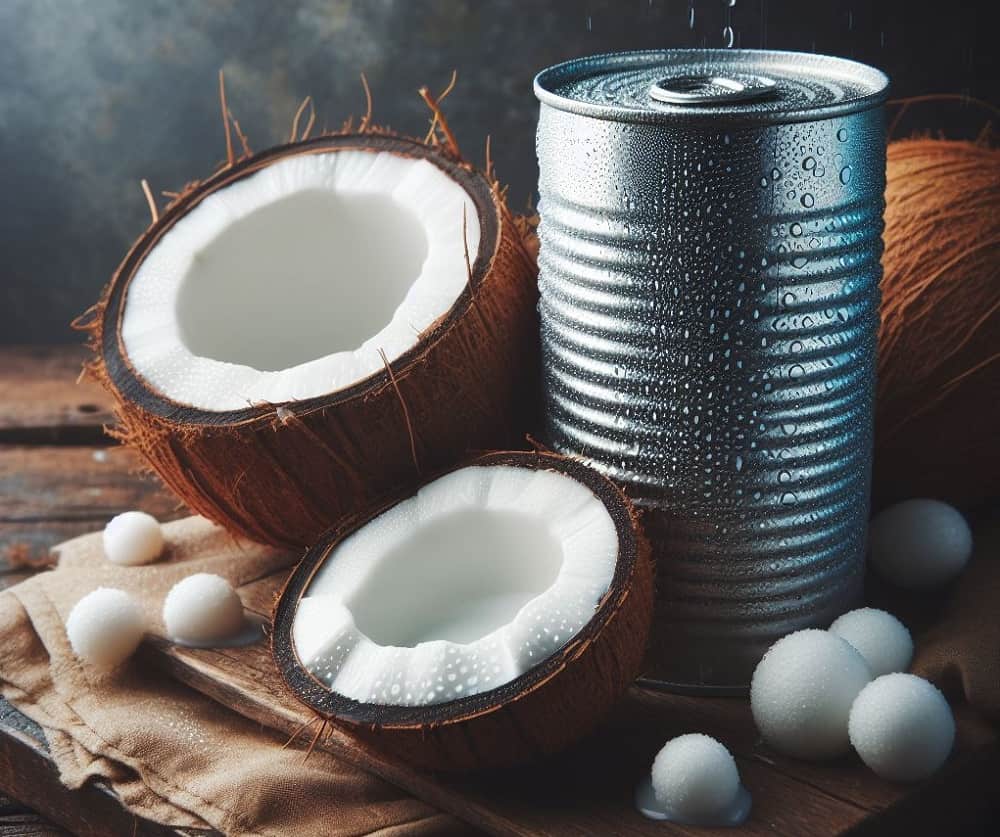Looking for coconut cream Vs evaporated milk guide?
Coconut cream and evaporated milk are similar alternates to regular dairy cream and have a lot of benefits and uses. Depending on the need, both can be super beneficial. It is a matter of personal preference what one would like and what is suits. So, to sum up, and to help you make a better choice, we have explained in detail the difference between coconut cream and evaporated milk.
Coconut Cream
Coconut Cream is created by processing and mixing a 4:1 ratio of coconut and water. It is a much thicker form of coconut milk which has more fat content and less water. Coconut cream has a very high fat content with 19-22% of fat. Coconut cream is similar and equivalent to heavy whipping cream and has a very thick consistency.
A single cup of coconut cream has 450 calories, around 40 grams of saturated fat, 2 grams of fiber, and 4 grams of protein. An average tablespoon of coconut cream has around 68 calories. Coconut Cream is considered a great source of protein, magnesium, antioxidants, phosphorus, folate, and chlorine.
Uses
Coconut cream is also commonly used by people as an alternative to vegan and ketogenic diets. As it is low in carbs, and with high fat content it suits these diets very well. For people looking for alternate dairy-free whipped cream, as it is savory and rich, Coconut cream is perfect for them. It is considered a great substitute for desserts that require heavy whipping cream.
Coconut cream is very commonly used in sauces, dips, and shakes. It’s gaining popularity as an alternative to traditional dairy cream. When using coconut cream for your dishes, you will notice a slight coconut flavor in it. Coconut creams are available in cartons and cans.
Benefits
As coconut cream is gaining popularity as an alternative to traditional dairy cream, let’s see some benefits below.
- Richer In Nutrients: Coconut Cream is a great source of all essential minerals like calcium, magnesium, iron, sodium, and phosphorous. It is also a great source of Vitamin B, C and E. Vitamin B helps form Red Blood Cells, and the calories are turned into reusable energy.
- No Harmful Chemicals: Coconut Cream is 100% organic and there are no harmful chemicals in it. Diary creams available are processed and treated with different chemicals which can be harmful. These processes and unknown chemicals can affect your health in the long run. So as compared to Coconut cream, it is a preferred choice among many people due to it being organic and free from any kind of chemicals.
- Sustainable Choice: The use of coconut cream is a sustainable choice. People these days are looking for alternatives that are sustainable in the long run. Coconut trees are grown without any human intervention in tropical lands and are produced all year round. The coconuts are harvested naturally without harm to the ecosystem.
- Super Taste & Texture: Coconut cream has a superior and much better taste than dairy cream. It has a thick texture similar to whipped cream. It’s commonly used in making sauce, soup, and curry.
- Digestive benefits: Coconut cream is also considered great for digestion and metabolism. The presence of MCT (Medium Chain Triglycerides) helps in better digestion. It is commonly used by people to improve digestive use which contributes to healthy living. The presence of MCT helps in a stronger immune system.
- Diary Free & Versatile: As coconut cream is dairy free it is considered by people following a vegan diet. Apart from veganism, Keto Diet followers also considered Coconut cream as an alternative to dairy cream. It is very helpful as It is low in carbs and high fat content.
Evaporated Milk
Evaporated Milk is made by removing around 60% of the water from cows’ milk through a slow heating process. After the water is removed, the remaining mixture which has around 7% of fat is homogenized and then sterilized and canned. Evaporated milk has a dense & creamy texture with a rich flavor. It has a great shelf life and can be stored for months.
Condensed milk is a thicker and more concentrated version of regular milk and has a caramelized flavor and color. Even after removing half of the water content, the nutrient composition is intact making it similar to nutrient-rich milk.
Whole evaporated mile has around 338 calories in a serving, with 25 grams each of sugar and carbs and 17 grams of protein. Fat content is around 19 grams.
Uses & Benefits:
Evaporated milk is used for baking & cooking or as a sweetener. Evaporate milk is less sweetened as compared to condensed milk. Evaporated milk is also used in prepared dishes such as oatmeal, casseroles, soups, and mashed potatoes. It is also used to make custards and puddings. People often use evaporated milk for hot chocolates or coffees to get a rich flavor and a creamy texture.
Evaporated milk is also very beneficial for people who are trying to gain weight and want to increase their miner intake. Remaining underweight can be a risk of several infections, dementia, and other complications; so, using evaporated milk can overcome these challenges and help you gain weight with the concentration of healthy nutrients.
Evaporated milk has Vitamin D and A. It is high in minerals such as phosphorus and calcium which are essential for healthy bones.
Storage & Availability:
Evaporated Milk is very common and can be found at supermarkets near you. It can be stored and preserved for over a year. Once the can/package is opened it is suggested to be stored at a cool dry place and to be used within five days.
Now you know the difference between coconut cream Vs evaporated milk, Contact KAP a leading coconut cream manufacturers to order coconut cream.

Experts on Sri Lankan Coconut Products.
